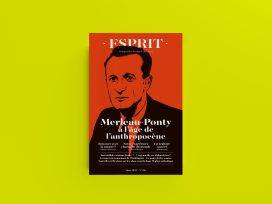Abstracts Esprit 11/2004
Abdelwahab Meddeb
Smugglers’ paths
Strolling up and down smugglers’ paths around Tangiers, one can catch sight of the Spanish coast in the distance and the straits that keeps the two shores of the Mediterranean apart. Watching the shoreline, one senses the maritime paths that carry another type of contraband, in the form of attempts to smuggle oneself across to Europe and its promises.
Jacob Rogozinski
Back to the ghetto?
Two recently published books, the late Benny Lévy’s être juif (Being Jewish) and Jean-Claude Milner’s Les Penchants criminels de l’Europe démocratique (the criminal proclivities of democratic Europe), are an opportunity to ponder afresh over the relationship between Judaism and modern thought, as both books are harshly critical of the legacy of the West. Where do these twin onslaughts strive to take us back to? To the very letter of the Book? To tradition? To a sense of identity? By way of counterpoint, the line of reasoning developed by Jean-Michel Salanskis suggests a richer type of relationship between Judaism and democracy.
Marius Schattner
Religious and secular attitudes in Israel: Historic moments in an identity conflict
Whereas Zionism is being increasingly identified with Israel’s religious radicals, a timely reminder is in order regarding the complex nature which links between religious and secular attitudes to the country’s national identity have been taking on ever since the beginnings of Zionism.
Nathalie Savary
Priority access schemes at the Paris Institute of Political Science: From initial controversies to early outcomes
In 2000, a proposal made by the elite Paris Institute of Political Science (“Sciences-Po”) to admit students from urban ghettoes caused a heated controversy. With the benefit of hindsight, how can we assess that debate, subsequent initiatives of the same kind, as well as the early outcome? This must be made from a multiple point of view: those of the students and the academic institutions involved, as well as those secondary schools that are participating in the scheme.
Olivier Mongin
The twin preconditions of a debate over the European Union. Socialism and globalisation
What is at stake over Europe and the Constitutional treaty is the nature of left-of-centre politics and its ability to set out a clear-cut set of policies for welfare and industrial relations. Since the 1980s, the European issue has been lying at the core of the problems left-wing politicians typically experience when outlining their construction of ongoing economic and societal change.
John Forrester
Freud as barometer for the 20th century
Freud’s work and his invention of psychoanalysis brought the 20th century more than a new scientific discipline: a fresh atmosphere that pervades both artworks and individual thinking. Speaking as a historian of science, the author reviews three classical studies into the history of psychoanalysis which highlight various separate ways of acclimatising this discipline to different cultural circumstances.
Andreas Mayer
The collective history of Freud’s The Interpretation of Dreams
In order to understand how this canon of psychoanalysis gained its prominence, one must tread new ground and revisit the whole history of the gradual development of this book (which is also the history of the psychoanalytical method) throughout its eight successive editions.
Alain Ehrenberg
The cerebral individual
Ever measured up as it is against those other scientific disciplines that also strive to account for human nature, psychoanalysis today must face up to the expansion of cognitive sciences. Now what type of construction of the individual is implied by ongoing research on the brain by cognitive scientists? What is their notion of man in its relationship with society? Looking beyond their points of friction, how do we live with the divergent interpretations these two disciplines produce?
Pierre-Henri Castel, Bernard Perret, Jean-Michel Thurin
How do we assess psychotherapies? A panel discussion
Today a wide range of therapies are there to take care of psychological suffering. Can they be measured up against each other? Are some to be recommended rather than others? Last spring in France, a heated controversy over these issues pitted against each other specialists of cognitive and behavioural therapies and the various psychoanalytic currents. What are the lessons from that debate?
Published 9 November 2004
Original in French
Contributed by Esprit © Esprit
PDF/PRINTNewsletter
Subscribe to know what’s worth thinking about.



